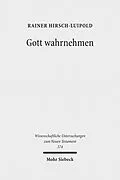The "spiritual gospel" highlights the senses. It details a tasting of exceptional wine, the stench of death, a finger in the risen Christ's wounds. In a fresh reading of these narratives, the author presents his overall view of the literary technique, pragmatics and theology of the Fourth Gospel.
Surprisingly, the "spiritual gospel" places a special emphasis on the senses. It details a tasting of exceptional wine, the stench of death, a finger in the risen Christ's wounds as an affirmation of new life. Rainer Hirsch-Luipold interprets these stories as the Johannine answer to the fundamental obstacle in the quest for knowledge of God: the fact that "nobody has ever seen God" (John 1, 18). Based on the idea of an incarnation of the divine Logos, the Fourth Gospel formulates a christological aesthetics of the Invisible. Since the utterly transcendent and unknowable God has stepped over the threshold of his divine being and entered the world, the readers gain an immediate perception of God through the eyes, mouths and noses of first witnesses. According to the Gospel's soteriological pragmatics, the knowledge of God thus rendered leads to belief and, in turn, everlasting life. On the basis of a fresh reading of three exemplary stories, the author presents his overall view of the literary technique, pragmatics and theology of the Gospel according to John.
Autorentext
Geboren 1967; seit 2011 Ordentlicher Professor für Neues Testament und Antike Religionsgeschichte an der Universität Bern; seit 2015 zusätzlich Extraordinary Professor an der Stellenbosch University (SA), Department of Ancient Studies.
Surprisingly, the "spiritual gospel" places a special emphasis on the senses. It details a tasting of exceptional wine, the stench of death, a finger in the risen Christ's wounds as an affirmation of new life. Rainer Hirsch-Luipold interprets these stories as the Johannine answer to the fundamental obstacle in the quest for knowledge of God: the fact that "nobody has ever seen God" (John 1, 18). Based on the idea of an incarnation of the divine Logos, the Fourth Gospel formulates a christological aesthetics of the Invisible. Since the utterly transcendent and unknowable God has stepped over the threshold of his divine being and entered the world, the readers gain an immediate perception of God through the eyes, mouths and noses of first witnesses. According to the Gospel's soteriological pragmatics, the knowledge of God thus rendered leads to belief and, in turn, everlasting life. On the basis of a fresh reading of three exemplary stories, the author presents his overall view of the literary technique, pragmatics and theology of the Gospel according to John.
Autorentext
Geboren 1967; seit 2011 Ordentlicher Professor für Neues Testament und Antike Religionsgeschichte an der Universität Bern; seit 2015 zusätzlich Extraordinary Professor an der Stellenbosch University (SA), Department of Ancient Studies.
Titel
Gott wahrnehmen
Untertitel
Die Sinne im Johannesevangelium. Ratio Religionis Studien IV
Autor
EAN
9783161549007
Format
E-Book (pdf)
Hersteller
Genre
Digitaler Kopierschutz
Adobe-DRM
Dateigrösse
3.99 MB
Anzahl Seiten
442
Lesemotiv
Unerwartete Verzögerung
Ups, ein Fehler ist aufgetreten. Bitte versuchen Sie es später noch einmal.
